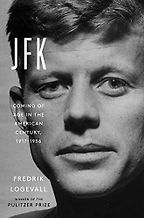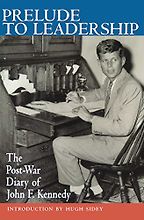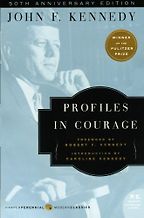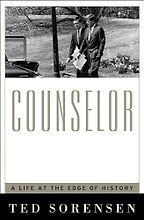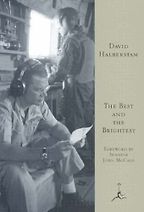Although 40,000 books have been published about the Kennedys, according to the estimate of Jill Abramson, there are few serious efforts, prior to yours, to take comprehensive look at the life and times of JFK, America’s famous 35th president.
There are many books, as you say, that deal with aspects of his presidency and his family. But we don’t have a lot of full-fledged biographies of JFK himself, ones that contextualize his life and give due attention to his formative years. I don’t know that I have a good explanation for why. But it did cause me to think that there was an opening here. I had written about Kennedy before in different contexts, mostly pertaining to the Cold War and to Vietnam. Given that the materials available at the Kennedy Library and elsewhere are so rich, I thought I was in a good position to fill the lack of a real life-and-times biography.
Embers of War: The Fall of an Empire and the Making of America’s Vietnam, your 2012 history of America’s involvement in Vietnam, won both the Pulitzer and Frances Parkman prize. Is writing about Vietnam what led you to JFK?
To a degree, yes. Coincidentally, I opened Embers of War with writing about JFK, when he visited China in 1951. I also wrote about Kennedy before, in other articles and other books, and have taught about the Kennedy years in my classes. So, I was already familiar with and interested in him and his era.
Tell me about JFK, the man—and your book about him, the first volume of your planned two-part biography, which I asked you to discuss as one among the five books you’ve named.
Kennedy is certainly an iconic figure of the 20th century; he is also a highly consequential figure, I would argue, especially in American history, but indeed international history. His lifespan, which is 1917 to 1963, was an extraordinary period in world history and US history.
Hence the reason this became a two-volume work. In volume one, I cover his life through 1956, when he was elected to the Senate, and I also tell a second story about the rise of the United States to great power status and then to superpower status. That second story, remarkable in its own right, maps onto the life of Kennedy. That is, you can better understand some of the seminal developments of the mid-20th century through the lens of JFK’s life. Thus, the debate in the United States between so-called isolationists and interventionists prior to the U.S.’s entry into World War II; the Second World War itself; the origins of the Cold War; the beginnings of the civil rights struggle and McCarthyism—I believe all of these important developments and controversies in the middle decades of the 20th century are illuminated by looking at them through the prism of Kennedy’s life.
It’s hard for me to imagine people not knowing the basic facts of JFK’s life, but because we have an international audience, can you please convey what is most important for people to grasp about the man who became America’s thirty-fifth president?
We need to grasp that he lived through an extraordinary half century, and that he came of age during the Second World War. Also, he was one of nine children, in a family that became fabulously wealthy. As a result, Jack Kennedy did not suffer during the Great Depression in the way that many others did. He grew up as a young man of privilege.
“Kennedy kept wonderful diaries”
But he also had intense challenges throughout his life. He was sickly from a young age to the end, and he lost the siblings closest to him in age. His older brother was killed in World War II. Kathleen (or Kick), his older sister and the sibling he was in many ways closest to, died in a 1948 plane accident. And he effectively lost his sister Rosemary to a botched lobotomy in 1941. So, he had a lot of frailty and tragedy to overcome.
Finally, we should note that he served with distinction in the South Pacific during World War II, and that soon after he began his meteoric rise in politics. He won his first election to the House of Representatives, from the 11th District of Massachusetts, when he was still shy of 30.
Turning to the books you selected, I thought the place to start was Prelude to Leadership: The Postwar Diary of John F. Kennedy.
Kennedy kept wonderful diaries, which are quite useful from a biographer’s perspective, at various points in his life, particularly while travelling. This book, edited by Deirdre Henderson, is composed of what he wrote while he toured Europe in 1945, right after the Germans surrendered and immediately before the Japanese sued for peace. There is a foreword by Hugh Sidney, the journalist, who knew Kennedy quite well. The book is fascinating because it is a window into what a young Kennedy, just decommissioned from the Navy, was thinking as he’s seeing up-close the destruction wrought by World War II in Europe and interacting with a lot of high-powered people. He’s clearly fascinated by politics and by international relations.
How do you think his familiarity with the horrors of war as a reporter and as a Navy man influenced his views?
When he wrote these diaries, it was only about a year and a half since he’d returned from his own service in the Pacific theatre. He’s clearly skeptical about the wisdom of using military power to solve political problems. That’s one thing that comes through in the diaries. At the same time, he makes clear his conviction that the United States must play a leadership role in the new international system that is emerging from the rubble of war. Kennedy is convinced, as he travels in these middle months of 1945, that the United States has newfound responsibilities in the global arena, but that it cannot go it alone; it must work in concert with other nations. He endorses the concept of collective security.
Your book begins by detailing Kennedy’s pre-war travels throughout Europe, which would not have been possible without the extraordinary wealth and position of his father, who was Ambassador to the United Kingdom on the eve of World War II.
There’s no question that Joe Kennedy helped pave the way for JFK, his second son. Through his wealth and through his connections, he made it possible for Jack to undertake these travels both before and after World War II, which proved really important to JFK’s maturation as a thinker and his emergence as a political leader. As you say, I open my book with his travels in Europe in 1939. And though now, in 1945, he is emerging from his father’s shadow, it would have been very hard undertaking these travels, maybe impossible, without the older man’s help.
Kennedy has two things in common with the 45th president of the United States. Both he and Trump were sons of extreme fortune and both were second sons whose older brothers were long thought to be the heirs apparent.
It’s true that Trump and JFK were second sons who lost their older brothers. They were both born to privilege and to wealth. And you can say that there’s one more thing that they had in common, they were both sons of very domineering fathers.
Get the weekly Five Books newsletter
But you can also point to the profound differences. From a young age, John F. Kennedy was intensely interested in history, interested in international affairs and interested in other countries. He had an openness about other cultures, he understood competing visions of national interest and he was comfortable with complexity. As I say in the book, Kennedy, even as a young man, treated serious things seriously, and thought long and hard about the problems of world affairs, and about the challenges of democratic leadership. He always put a premium on reasoning from evidence. The same could hardly be said of Trump.
Profiles in Courage is your next recommendation. Of the books written by JFK this is the most familiar to readers, but it may still be unfamiliar to some, so please tell us about it.
This book is about US senators from throughout the nation’s history, who in his judgment had taken principled stands, even at the risk of hurting their political self-interest by going against the wishes of their constituents or region. It’s a book that he published in 1956, as a U.S. Senator who was beginning to think about a White House run, but it concerns issues and conundrums that had fascinated him since his undergraduate days. His senior thesis at Harvard, which became his first book, Why England Slept, concerns the development of British appeasement policy in the 1930s. But in a broader sense it’s about the dilemmas of leadership in democracies in times of crisis, and in this way is a kind of prequel to Profiles.
“He’s clearly skeptical about the wisdom of using military power to solve political problems”
The core question in Profiles in Courage is: When and in what circumstances should politicians seek to go beyond their own personal self-interest and consider what’s best for the nation? When should politicians defy the wishes of their constituents, their party or their region to take policy positions that they think are in nation’s interest? The book investigates why certain senators took such stances throughout U.S. history, how they did it and what we can learn from them. In this way I would argue it’s a timeless book that still has resonance for us today, almost seven decades after publication.
There is controversy about whether Kennedy wrote the book himself. My conclusion is that his role was crucial. His assistant, Ted Sorensen, drafted the case studies that compose the middle of the book, with help Jules David, a scholar at Georgetown. But Kennedy was responsible for the broad themes and the argument, as laid out in the introduction and the conclusion—the most important parts of the book, both then and today. Long before he met Sorensen, he had been fascinated by the concept of political courage and had honed his views on the matter.
You’ve named a book by Sorensen next on your list of books to read about JFK. Before we talk about that one, I wanted to ask whether you think Kennedy can be seen as ‘a profile in courage’ for any stance that he took during his time in the Senate.
I think so. For example, to take a rather esoteric topic, there is his stance in favour of the Saint Lawrence Seaway, even though powerful interests in Massachusetts were against it and even though allies warned Kennedy he might be committing political suicide in supporting it. He favoured the Seaway because he thought it was in the interest of the nation, and ultimately also of Massachusetts.
On the flip side, he wasn’t always a ‘profile in courage.’ The outstanding example is the controversy concerning Senator Joseph McCarthy and McCarthyism. In the minds of many, myself included, he was unduly cautious in his response to McCarthy’s red-baiting demagoguery, too reticent about condemning it, even if his stance made political sense at the time—McCarthy had broad support among Irish Catholic voters in Massachusetts, and JFK did not wish to alienate them. Also a factor in his thinking: his father, Joe Kennedy, was close to McCarthy, as was JFK’s brother, Robert.
Moving on to the book by his assistant and speechwriter, Theodore Sorensen, please tell me about Counselor.
Counselor is the memoir of Ted Sorensen, who joined JFK’s staff in early 1953, just as JFK was entering the Senate. He swiftly became Kennedy’s most important aide, a distinction he arguably held right to the end, in November 1963. I argue it was one of the most remarkable partnerships in American political history, as the two men collaborated closely on speeches, on articles, as well as on policy issues. I suggest we can think of them as composer and lyricist, as the Rodgers (JFK) and Hart (Sorensen) of American politics.
Five Books interviews are expensive to produce. If you're enjoying this interview, please support us by donating a small amount.
Sorensen is really a rare creature in Washington. He’s somebody who helps devise the substance of policy positions and is then able to translate those positions into elegant, concise prose. It’s not that common that one person can perform both of those functions. Sorensen did. This book, Counselor, which he wrote toward the end of his life, provides insights into this remarkable partnership and what made it work so well. Though Sorensen would have a long and productive career after Kennedy’s death, his name would be forever associated with JFK.
The back of this book characterizes Sorensen as Kennedy’s closest adviser, I assume whoever wrote that is not factoring in Robert Kennedy, his younger brother, who was his attorney general during his presidency. To what extent was the Kennedy presidency a partnership between brothers?
To an important extent it certainly was. Once we get to the presidency, you can have a pretty interesting argument about who mattered more, on a day-to-day basis, Bobby Kennedy or Sorensen. But the truth is they’re both vital. Kennedy depended on both of them. For the crucial policy choices JFK faced as president, Bobby was often in the room when Ted Sorensen wasn’t. That suggests, as time progresses, Bobby’s influence became greater. But Sorensen remained vital too.
Last on your list of books to read about JFK is a title that is so familiar in the American political and historical lexicon that it’s become a meme. Tell me about David Halberstam’s The Best and the Brightest.
Halberstam was a New York Times reporter, one of the first members of the American press to report in-depth from Vietnam itself. He arrived in South Vietnam during mid-1962, in the middle of the Kennedy administration. Initially, he believed in the cause, believed it important for the United States to help the South Vietnamese prevail against the insurgency. Over time, he began to doubt this belief. As problems plagued the war effort, he reported the fact, much to the annoyance of the White House, including Kennedy himself. That’s the background.
It’s a sprawling, mesmerizing work. It belongs on any short shelf of essential Vietnam War books. Halberstam looks at the Kennedy years and the Johnson years, asking the question: What brought the so-called ‘best and the brightest,’ referred to in the somewhat ironic title, to undertake this large-scale war in Vietnam? Halberstam doesn’t get everything right. For example, to my mind he exaggerates the amount of hubris in American decision-making in these years; my research and that of others indicates that US officials were more pessimistic, more gloomily realistic, than Halberstam lets on. Still, The Best and The Brightest is altogether an extraordinary work—vivid, incisive, engrossing. Reading it as an undergraduate helped convince me to go to grad school and become a historian.
The most common ‘counterfactual’ question of the twentieth century, next perhaps to, what if Hitler hadn’t been born, is surely, what if Kennedy hadn’t been shot? Many argue that so-called ‘Americanization’ in Vietnam would not have happened, while others insist it would have. Is hypothesizing about what might have been a thought experiment that historians should engage in?
I believe they should. I’m one of those historians who believes that asking ‘what if’ questions, beyond whatever parlour-game fascination it may hold, has historical utility. We can better understand what happened in history if we consider what might’ve happened, if we consider the plausible unrealized alternatives. I’ve written about the question of what might have happened in Vietnam if Kennedy had lived, if Lyndon Johnson remained Vice President and Kennedy had to make the decisions regarding whether to send in more troops in 1964-65 when South Vietnam was on the brink of defeat. I’ll consider it anew as I research and write Volume 2.
Interview by Eve Gerber
February 1, 2021. Updated: February 15, 2022
Five Books aims to keep its book recommendations and interviews up to date. If you are the interviewee and would like to update your choice of books (or even just what you say about them) please email us at [email protected]
